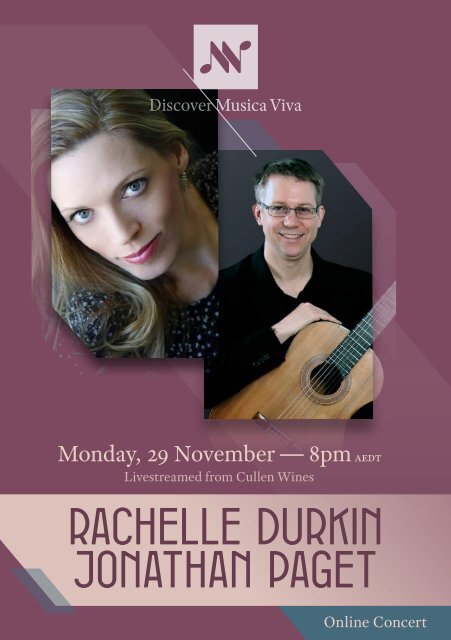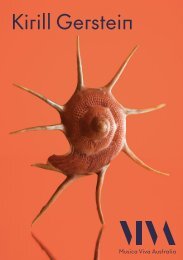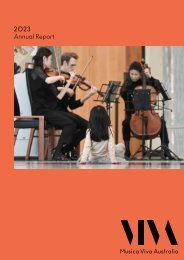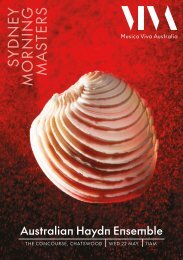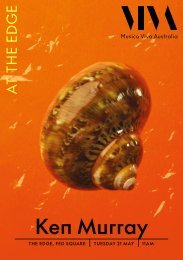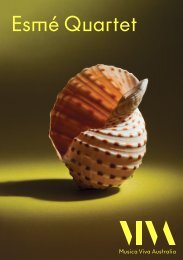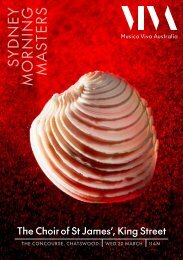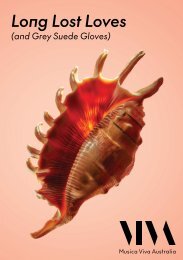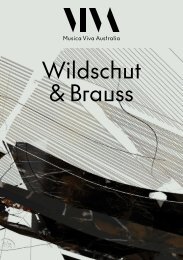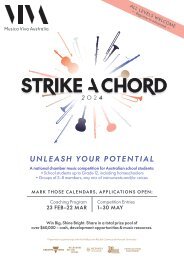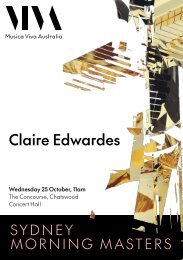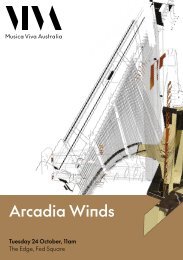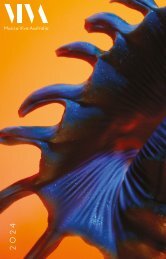Rachelle Durkin & Jonathan Paget Program Guide | November 2021
Create successful ePaper yourself
Turn your PDF publications into a flip-book with our unique Google optimized e-Paper software.
Monday, 29 <strong>November</strong> — 8pm aedt<br />
Livestreamed from Cullen Wines<br />
RACHELLE DURKIN<br />
JONATHAN PAGET<br />
Online Concert
—<br />
Take flight in our boundless new vision.<br />
Tickets on sale now<br />
musicaviva.net.au
Musica Viva Australia acknowledges the Traditional Custodians of the many<br />
lands on which we meet, work and live, and we pay our respects to Elders past and<br />
present - people who have sung their songs, danced their dances and told their<br />
stories on these lands for thousands of generations, and who continue to do so.<br />
PROGRAM<br />
Benjamin BRITTEN (1913-1976)<br />
Folk Songs for Voice and Guitar (1956-58)<br />
I I will give my love an apple<br />
II Sailor-boy<br />
III Bonny at Morn<br />
David BRAID (b. 1975)<br />
Songs of Contrasting Subjects, Op. 47 (2015)<br />
II Fear No More<br />
Leo BROUWER (b. 1939)<br />
‘Balada de la Doncella Enamorada’<br />
from El Decamerón Negro (1981)<br />
Heitor VILLA-LOBOS (1887-1959)<br />
Bachianas brasileiras No. 5 (1938/45)<br />
Francisco TÁRREGA (1852-1909)<br />
Recuerdos de la Alhambra (1899)<br />
Manuel DE FALLA (1876-1946)<br />
Siete canciones populares españolas (1914)<br />
I El paño moruno<br />
III Asturiana<br />
IV Jota<br />
7 min<br />
5 min<br />
5 min<br />
6 min<br />
5 min<br />
8 min<br />
<strong>Rachelle</strong> <strong>Durkin</strong>, Soprano<br />
<strong>Jonathan</strong> <strong>Paget</strong>, Guitar<br />
3
About the Music<br />
Britten’s folk song arrangements for voice<br />
and guitar were written for renowned<br />
tenor Peter Pears (1910-1986) (also Britten’s<br />
partner) who collaborated extensively with<br />
guitarist Julian Bream (1933-2020). They<br />
continue the trend of Vaughan Williams<br />
(and other associated with the ‘English<br />
Musical Renaissance’) in harnessing folk<br />
song to create a distinctly English musical<br />
idiom. These arrangements are delightfully<br />
quirky, straddling the line separating the<br />
traditional and the modernist. In clothing<br />
the familiar with strangeness, we are led<br />
to reconsider the meaning of the text. In<br />
‘I will give my love an apple’ a series of<br />
riddles (subsequently explained) become<br />
metaphors for love, while ‘Sailor-boy’<br />
satirises the fleeting nature of maritime<br />
courtship rituals. The text of ‘Bonny at<br />
Morn’ depicts the impact of a baby on rural<br />
farming life (‘we’re all laid idle wi’ keeping<br />
the bairn’) while Britten’s somewhat darker<br />
musical setting hints at the spectre of postnatal<br />
depression.<br />
Songs of Contrasting Subjects by<br />
contemporary Welsh composer David<br />
Braid (b. 1970) takes a series of disparate<br />
and unrelated texts from the English<br />
literary canon. ‘Fear no More’ is a poem by<br />
Shakespeare from the play Cymbeline and<br />
constitutes a philosophical contemplation<br />
of death. With a lyricism reminiscent<br />
of Britten, Braid’s counter-intuitive<br />
rhythmic placement creates a poignant and<br />
thoughtful miniature.<br />
‘Ballada de la Doncella Enamorada’<br />
(Ballad of the Young Girl in Love) is the<br />
third movement of the suite El Decamerón<br />
Negro (The Black Decameron) by Cuban<br />
composer Leo Brouwer (b.1939). The suite<br />
is inspired by the similarly titled collection<br />
of African folk tales concerning love and<br />
sexuality by anthropologist Leo Frobenius<br />
(1873-1938). Likewise, Frobenius adopts the<br />
word ‘decameron’ with reference to the<br />
classic 14th century collection by Boccacio.<br />
This music stems from Brouwer’s third<br />
(neo-romantic) period. It combines postminimalist<br />
textures, neo-tonal harmonies,<br />
and Afro-Cuban rhythms.<br />
The Bachianas brasilieras are the epitome<br />
of the fascination held by composer Heitor<br />
Villa-Lobos (1887-1959) for combining<br />
Baroque counterpoint (especially that of<br />
Johann Sebastian Bach) with the idioms of<br />
Brazilian popular styles—such as the dotted<br />
dance rhythms of the choro. No.5 was<br />
originally for eight cellos and soprano; and<br />
the first movement (‘Cantilena’), sung here,<br />
was re-arranged for voice and guitar by the<br />
composer at the request of guitarist Andrés<br />
Segovia (1893-1987). The central section<br />
sets an evocative poem by Ruth Corrêa<br />
4
describing a nocturnal scene of moonlight<br />
and drifting clouds. The combined effect is<br />
reminiscent of the jungle painting Le Rêve<br />
(The Dream) by Henri Rousseau (1844-<br />
1910).<br />
Recuerdos de la Alhambra [Memories of<br />
the Alhambra] is one of the most cherished<br />
works of the guitar repertoire, composed<br />
by Spanish guitarist Francisco Tárrega<br />
(1852-1909). The piece commemorates the<br />
Alhambra palace, a spectacular fortress<br />
complex in Granada, Spain—now treasured<br />
as one of the most beautiful exemplars of<br />
Islamic architecture in Europe. The piece<br />
is also the most well-known exemplar of<br />
guitar tremolo, which creates the illusion of<br />
a sustained melodic line, able to be phrased<br />
in vocal fashion. A highly influential<br />
pedagogue, Tárrega set the foundations<br />
for modern guitar technique and his pupils<br />
(among them Miguel Llobet and Emilio<br />
Pujol—arrangers of the next item on the<br />
program) sparked a modern Renaissance<br />
in solo guitar playing in the early twentieth<br />
century.<br />
Llobet (1878-1938) and revised by Emilio<br />
Pujol (1886-1980). As with the Britten,<br />
Falla’s expressive settings bring fresh<br />
meaning to the texts. El paño Moruno<br />
(the Moorish cloth) describes a stained<br />
cloth as a metaphor for the idea of ‘fallen’<br />
woman (with the cloth now selling for<br />
less), a notion that vividly reflects the<br />
gender inequality of the period and within<br />
traditional Spanish culture. ‘Asturiana’ (a<br />
regional style) describes the heartache of a<br />
jilted lover, and ‘Jota’ (an Aragonese dance)<br />
describes the piquant anguish of separation<br />
felt by young lovers.<br />
Siete canciones populares Española [Seven<br />
Spanish Folk Songs] are one of Falla’s<br />
most celebrated song cycles. Originally for<br />
voice and piano, they were subsequently<br />
arranged for voice and guitar by Miguel<br />
5
MEET THE ARTISTS<br />
<strong>Rachelle</strong> <strong>Durkin</strong>’s most recent<br />
performances include soprano soloist in<br />
Beethoven’s Symphony No. 9 with the<br />
Detroit Symphony under Leonard Slatkin,<br />
Musetta (La bohème) and Helena (A<br />
Midsummer Night’s Dream) with Hawaii<br />
Opera Theatre, Adina (L’elisir d’amore)<br />
with West Australian Opera and Opera<br />
Australia, Rossini’s Stabat Mater with the<br />
West Australian Symphony Orchestra<br />
under Asher Fisch, Donna Anna (Don<br />
Giovanni) with the Lyric Opera of Kansas<br />
City, Norina (Don Pasquale) with Opera<br />
Australia and The Metropolitan Opera,<br />
New York and a Gala Concert with<br />
Bryn Terfel at Leeuwin Estate, Western<br />
Australia.<br />
Other appearances have included<br />
Lisa in La Sonnambula, Clorinda in<br />
La Cenerentola and Miss Schlesen in<br />
Satyagraha at The Met and Violetta,<br />
Fiordiligi, The Countess, Armida<br />
(Rinaldo), Alcina and Tytania for Opera<br />
Australia.<br />
In <strong>2021</strong>, <strong>Rachelle</strong> played Tytania in A<br />
Midsummer Night’s Dream for the Adelaide<br />
Festival. In 2022, <strong>Rachelle</strong> will star as The<br />
Governess in State Opera South Australia’s<br />
production of Benjamin Britten’s iconic<br />
opera The Turn of the Screw.<br />
© PATRICK TOGHER ARTISTS’ MANAGEMENT <strong>2021</strong><br />
<strong>Jonathan</strong> <strong>Paget</strong> is an Associate Professor<br />
at the Western Australian Academy<br />
of Performing Arts, Edith Cowan<br />
University, where he has led the classical<br />
guitar program since 2005. Winner of<br />
multiple prestigious international guitar<br />
competitions, <strong>Jonathan</strong> has performed<br />
throughout Australia, the USA, and<br />
Asia, and at festivals such as the Darwin<br />
International Guitar Festival and the<br />
Port Fairy Spring Music Festival. He<br />
has performed with Karin Schaupp,<br />
Slava Grigoryan, and Chrystian Dozza,<br />
among others, as well as with the Silver<br />
Sands Guitar Trio from 2016-2019. He<br />
has released two solo CDs: Kaleidoscope,<br />
and Midsummer’s Night (Move Records),<br />
which have been played extensively on<br />
Australian radio. Reviews describe him as<br />
‘a fine musician with brilliant technique’<br />
[Soundboard, USA], ‘up there with some<br />
of the best’ [Classical Guitar, UK]. Winner<br />
of prestigious academic awards such as<br />
Fulbright and Hackett scholarships, <strong>Paget</strong><br />
completed doctoral studies at the Eastman<br />
School of Music in upstate New York. He<br />
has been the Associate Dean of Research at<br />
WAAPA since 2017 and actively researches<br />
guitar literature and performance<br />
practices.<br />
6
QR?<br />
Chopin’s Piano<br />
Online Concert: Thu 16 Dec, 7pm (AEDT)<br />
History comes to life as a cast of historical characters tell the tale of Chopin’s piano,<br />
their words set amongst a complete performance of his beloved Preludes.<br />
Tickets: $25<br />
musicaviva.com.au/chopins-piano-digital<br />
1800 688 482 (no booking fees)<br />
Special thanks to our Ensemble Patrons Michele and Stephen Johns, and Anonymous for their support of this online concert.
Music brings us together<br />
At Musica Viva Australia we are proud to share<br />
exceptional music with audiences of every age, location<br />
and circumstance — it’s what we have always done,<br />
and what we will always strive to do.<br />
With your contribution, we can support our professional<br />
musicians, introduce children to live music in schools,<br />
commission new works, create innovative and engaging<br />
online content, and develop future generations of artists.<br />
Scan the QR code to give today.<br />
Contact us on philanthropy@musicaviva.com.au


